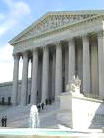| The Supreme Court unanimously upheld New York's unique system of choosing trial judges Wednesday, setting aside critics' concerns that political party bosses control the system. "A political party has a First Amendment right to limit its membership as it wishes and to choose a candidate-selection process that will in its view produce the nominee who best represents its political platform," Justice Antonin Scalia wrote for the court. In New York, primary voters elect convention delegates who choose candidates for the judgeships. Once nominated, those candidates run on the general election ballot. In practice, they frequently have no opposition. Unsuccessful candidates for judgeships and a watchdog group filed a lawsuit challenging the system. A federal district judge and the 2nd U.S. Circuit Court of Appeals agreed that it is very difficult for candidates to get on the ballot if they don't have support of the party leaders. In striking down the system, the two federal courts said judgeship candidates who are not the choice of the party leaders are excluded from elections by an onerous process that violates their First Amendment rights. The high court on Wednesday reversed the lower courts. Scalia said there is nothing unconstitutional about the process. The system's opponents "complain not of the state law, but of the voters' (and their elected delegates') preference for the choices of the party leadership," Scalia said. He said the state legislature is free to return to a primary if it wishes. Justice John Paul Stevens chimed in with a brief opinion distinguishing between a constitutional system and wise public policy, resorting to the words of former Justice Thurgood Marshall. "The Constitution does not prohibit legislatures from enacting stupid laws," Stevens said, quoting Marshall. Critics have said the conventions are patronage-driven affairs in which allies of party leaders are rewarded with judgeships and all others are shut out. The appeals court said that between 1990 and 2002, almost half the state's elections for Supreme Court justice — trial judges in New York's judiciary — were uncontested, calling them "little more than ceremony." The appeals court ordered the state to dispense with the conventions and switch to primary elections until state lawmakers come up with a new plan. Many legal and civics groups have come out in favor of appointing judges in New York. The U.S. Supreme Court previously has ruled that states can decide whether to use conventions or primaries to nominate candidates. States also can choose to have judges appointed rather than elected. Margarita Lopez Torres became the lead plaintiff in the lawsuit after Democratic leaders in Brooklyn blocked her from getting the party's nomination for a Supreme Court judgeship. She said the leaders turned against her shortly after her election as a civil court judge when she would not hire people they recommended. Three years later, Lopez Torres said they offered her a second chance if she would hire a leader's daughter. She refused. The state, the Democratic and Republican parties and the elections board joined to ask the high court to reverse the appeals court ruling. Former New York Mayor Ed Koch was among a diverse group of politicians and legal groups asking the court to uphold the lower court rulings. The state Legislature adopted the nominating conventions 86 years ago. Lawmakers scrapped direct primaries for New York's Supreme Court justices because of the potentially corrupting influence of having prospective judges raising campaign money. Other judges in New York are elected through primaries. The plaintiffs have said the current system leads to cozy relationships among judges, lawyers and politicians. |





